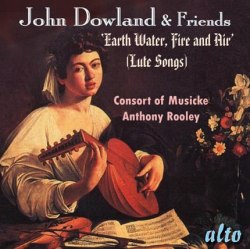|

Support us financially by purchasing
this disc through MusicWeb
for £5.99 postage paid world-wide.

|
John Dowland and Friends - Earth, Water, Fire and Air
John DOWLAND (1563-1626)
Come Again [4.20]
Wouldmy Conceits [5.28]
Shall I Strive [3.22]
Sleep Wayward Thoughts [3.39]
Toss not my soul [4.11]
From Silent Night [3.28]
Go Nightly Cares [3.06]
Sorrow Stay [3.30]
In Darkness let me dwell [4.10]
Thou Mightie God [7.41]
Claudin de SERMISY (c.1490-1562)
Las, je m’y plains [1.27]
Thomas TOMKINS (1572-1656)
Weep no more thou sorry boy [2.51]
O let me live for true love [4.06]
Thomas MORLEY (1557-1602)
Deep Lamenting [4.01]
Leave now mine eyes [3.35]
Thomas WEELKES (1576-1623)
Cease sorrows now [3.10]
Matthew LOCKE (1621-1677)
Break, Distracted Heart [5.46]
Consort of Musick/Anthony Rooley (director and lute)
rec. Forde Abbey, Dorset, February 1998.
ALTO ALC 1223 [71.10]
By 1998, when this disc first came out, Anthony Rooley’s Consort of Musick had been singing Dowland and other lute composers for almost 25 years. They had indeed become world specialists in their field and these shows in these mature and sensitive performances. It’s interested to compare some of them with older versions. The First Book was had its premiere recording in 1976 and the Second Book in 1977 for example. You can get Dowland’s complete works from the Consort of Musicke available as a boxed set on L’Oiseau Lyre.
Even so, what makes this collection worth having is not only the performances but the mixture of composers. These include a charming song by Sermisy, Las, je m’y Plains which seems curiously stranded amidst the later English pieces and who, anyway, died before Dowland was born. These proceed right up to Matthew Locke’s Break, Distracted Heart which is a weird little mini-dramabetween four dejected lovers who end up by various means, individually, “ending their fate”. So the idea with this Alto collection is that these pieces are somehow from ‘the same stable’ as songs like Sorrow Stay and Woeful Heart both from Dowland’s slightly less influential Second Book, published in 1600.
By 1998 the Consort’s personnel had altered. There is no Emma Kirkby and there is no counter-tenor: John York Skinner had been there in the 1970s. Rooley still had Evelyn Tubb with whom he had worked for a few years before and had by then discovered the mellow bass of Simon Grant. Whereas in 1976/7 Rooley had experimented with and had sometimes accompanied the songs with viols, on this disc it is just the lute, sometimes with one voice, sometimes with all four. On occasion the lute is not used at all, as in both of Tomkins’ madrigals Weep No More, Thou Sorry Boy from his 1622 collection with its vivid word painting and the moving O let me live for true love.
There is much to admire, enjoy and love on this disc. A good example of the approach is the very first track of this 1998 CD: Dowland’s Come Again. In 1976 Martyn Hill had sung it accompanied by lute and bass viol. Nothing wrong with that you say, except that all six verses were rather the same but with a good attempt at expressing the words in a sensitive way. This new version uses only five verses and starts with the lugubrious bass voice of Simon Grant. The verses - or even the half verses - are divided between the four differing voices and the refrain is sung by one voice then two then three then four. Rooley isn’t frightened to play with the tempo either; all very imaginative and actually quite witty - a good start. The same kind of approach is applied later to another song from Book 1, Sleep, Wayward Thoughts.
Shall I strive is found in ‘The Pilgrim’s Solace’ of 1612. It started life as a Galliard for Lute Solo (Mignarda). I’ve often felt that the text does not fit convincingly but it’s a wonderful piece and normally done as a lute song. It is here sung in four parts with lute and with the harmony realised from the lute tablature (see Fellowes Edition - Stainer and Bell) but the texts sensitively placed in the lower voices.
Would my Conceits has just three verses but in 1976 it took over seven minutes to get through. In this version, at a faster tempo, two minutes are knocked off the length but with no lack of expression. This is achieved through the vowel sounds, subtle dynamic alterations and equally finely judged tempo changes.
Another approach can be heard inToss not my soul, which in the score is supplied with two viol parts and three verses. Here we have just one verse recorded - thank goodness as the entire song with its repeats would be over 12 minutes. For the last repeat the line is beautifully ornamented by Evelyn Tubb.
A couple of interesting pieces by other composers should be highlighted. Morley’s Leave now mine eyes comes from his two-part Canzonets of 1595. It is given a beautifully rubato and an almost romantic rendition. It’s rare to hear Weelkes’ three-part Cease Sorrows Now from his 1597 collection done so movingly.
The anthology is curiously planned with six Dowland songs taking up the final tracks after a miscellany previous to them. Mostly they are slow as befits ‘semper Dowland semper dolens’.
Whilst one realizes that this is a budget disc and that it is a wonderful thing to have all of the texts, there are some amusing typos. I especially liked “O give me lime to draw weary breath” in Go Nightly Cares.
The Consort are in great form and at their best in many ways especially in this repertoire. At budget price this is worth every penny.
Gary Higginson
|



 All Nimbus reviews
All Nimbus reviews








